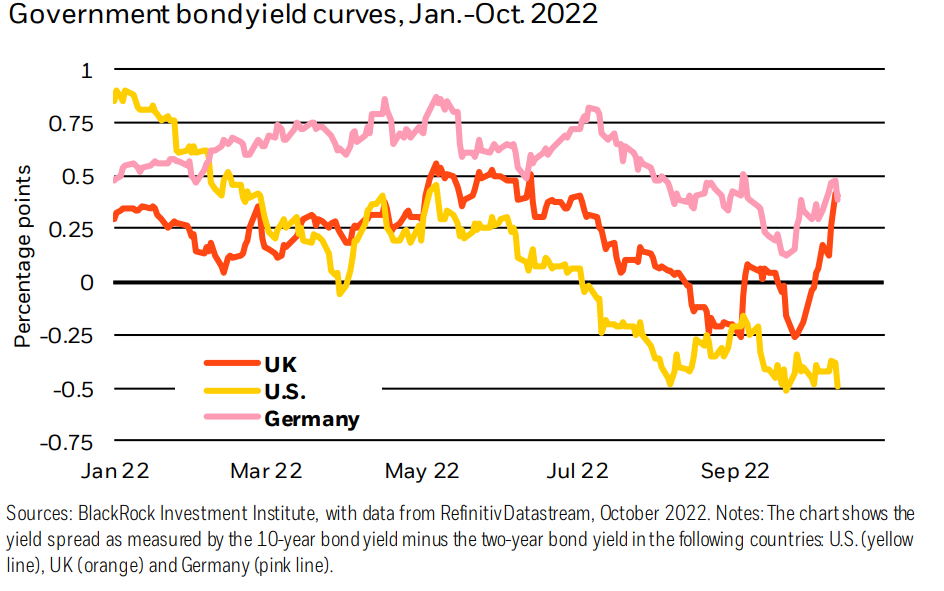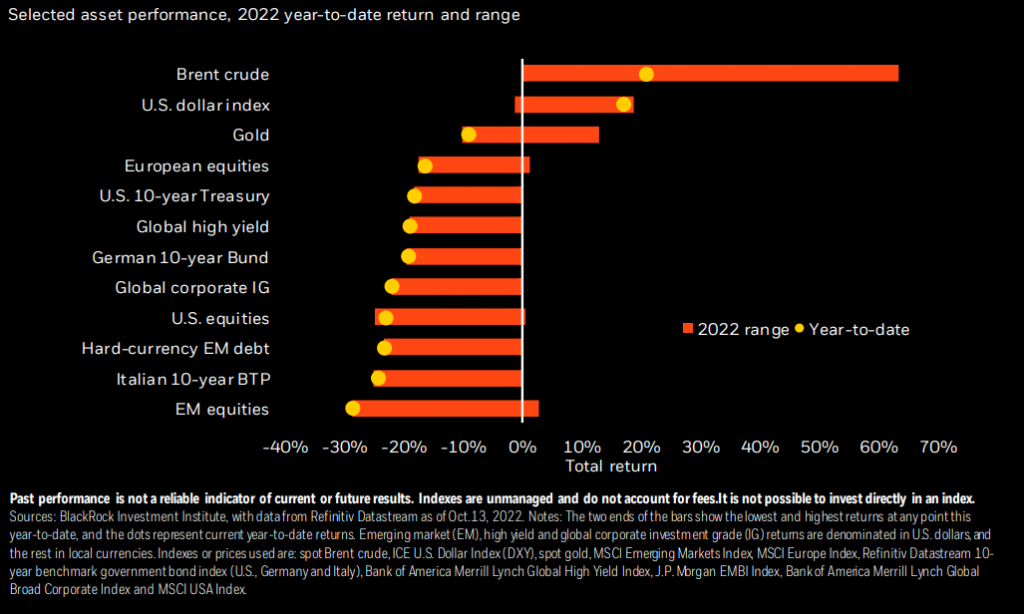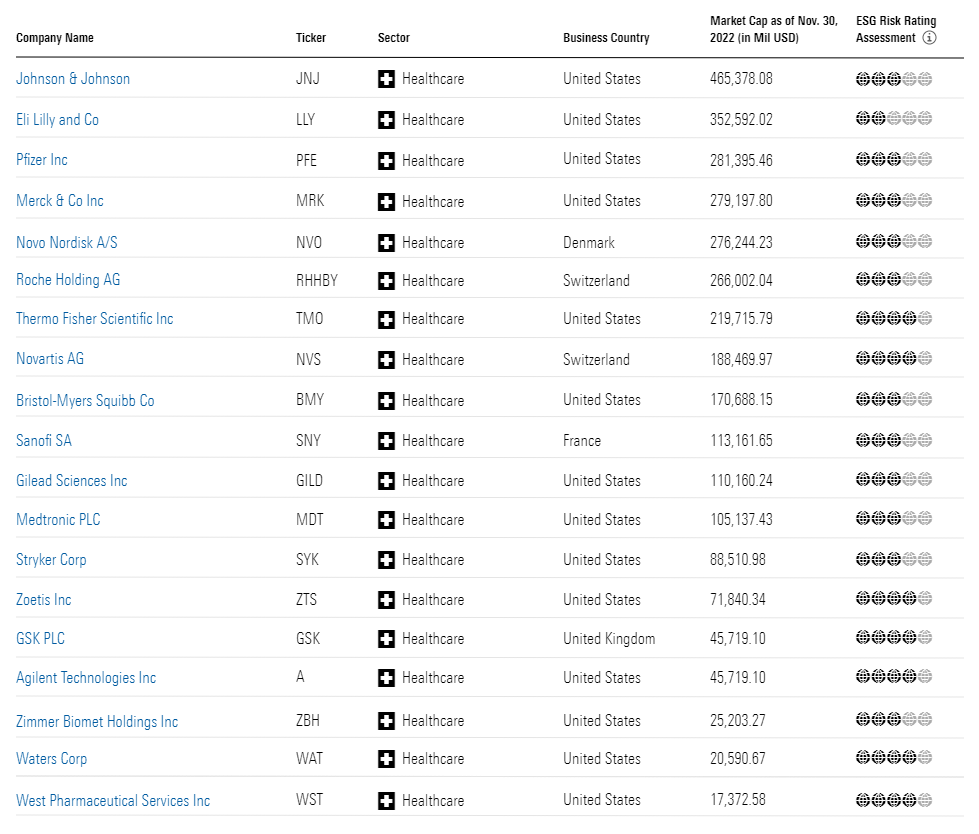Jean Boivin, Head of the BlackRock Institute, Wei Li, Global Chief Investment Strategist, Alex Brazier, Deputy Head and Scott Thiel, Chief Fixed Income Strategist all forming part of the BlackRock Investment Institute, share their insights on global economy, markets and geopolitics. Their views are theirs alone and are not intended to be construed as investment advice.
Key Points
Government bonds: We’re underweight government bonds because yields have room to move higher, and we don’t think they can be a safe haven when recession comes.
Market backdrop: Stocks were choppy and short-term U.S. Treasury yields jumped after data showed persistent U.S. core inflation. We think this is bad news for risk assets.
Week ahead: China’s activity data will help gauge how the economy is holding up given Covid restrictions. UK inflation data will likely reinforce expectations for further hikes.
Recession fears are roiling markets. Investors traditionally take cover in sovereign bonds, but we see this recession playbook as obsolete. Why? First, central banks are hiking rates to try to tame inflation, causing recessions. Second, we don’t see them cutting rates like they typically do in recessions due to persistent inflation. Third, we expect investors to demand more compensation for the risk of holding government bonds amid high debt loads. Result: We stay underweight Treasuries.
UK yields a glimpse of the future

In the Great Moderation, a period of steady growth and inflation, central banks would have eased policy on signs of contracting growth. That era is over. Now central banks are set to induce recessions by overtightening policy. In this supply-driven recession, high inflation and rising rates may break the fragile equilibrium where investors tolerated surging debt loads and forwent a higher term premium, or compensation for the risk of holding long-term bonds. The UK offers a glimpse of this. Long-missing bond vigilantes are back as markets question UK macro policy credibility. And financial dislocations have accelerated and amplified the move. The difference between 10-year and two-year gilt yields (orange line in chart) has surged. Yet yield curve moves of German bunds (pink) and Treasuries (yellow) show a muted response not yet pricing in a higher term premium.
We see long-term yields rising across developed markets. Why? Policy, inflation and debt. Central banks in the new regime face a sharper trade-off between growth and inflation than in the past. Yet their forecasts, as well as the International Monetary Fund’s update last week, aren’t acknowledging that the cost of bringing inflation down to targets is triggering recession, in our view. We think central banks will eventually halt rate hikes. But they won’t have done enough to get inflation all the way back down to target, implying they won’t be able to start easing policy, in our view. Higher policy rates and inflation create a ripe environment for investors to demand higher term premia for long-term bonds.
UK proof point
All of this underscores why the old recession safe-haven playbook doesn’t apply. That’s no mere musing: We see it playing out in the UK in real time. The energy crisis had already put the UK on the brink of recession. The Bank of England (BoE) could exacerbate the pain by hiking rates even more than originally expected to offset fiscal stimulus. Backlash to the planned stimulus has sparked a gilts selloff and led to the finance minister’s resignation. The BoE’s two-week buying of long-term bonds helped briefly drag down yields, but they spiked anew as the program ended last week. While the government has trimmed its tax cut plans, they have already dented UK fiscal credibility and would still add to the debt build-up during the Covid-19 shock. In this environment, bond vigilantes are back and heralding term premium’s return.
Our bottom line
We’re broadly underweight government bonds. U.S. bond returns are the most positively correlated to stocks in two decades on a 90-day rolling basis. We expect that correlation to stay positive, erasing bonds’ role as portfolio diversifiers. We don’t think long-term yields reflect the likely persistence of inflation and higher term premia coming as a result. Higher short-term rates also make the long end less attractive because investors can get decent returns in short-dated bonds with less interest rate risk. We stay underweight U.S. Treasuries. Policy rates would need to hold steady or fall for Treasury returns to flip positive, we find. We previously cut UK gilts to underweight on fiscal credibility concerns. We’re neutral on euro area bonds as we think expectations for European Central Bank rate hikes are too hawkish. But we’re underweight Italian bonds. Italy shares some of the UK’s vulnerabilities – worsening fundamentals from a current account deficit and a heavy debt burden.
Strategically, we’re underweight developed market government bonds and see yields higher in five years and beyond. We prefer inflation-linked bonds both tactically and strategically given they are not pricing in persistent inflation. We like high quality credit: Strong corporate balance sheets should limit default risks even in a recession, in our view.
Market backdrop
Stocks fell and short-term U.S. Treasury yields hit 15-year highs, further inverting the yield curve, after the U.S. core CPI hit a 40-year high of 6.6%. We think this shows that the U.S. economy is running above its constrained production capacity, including the labor market, reinforcing the Fed’s singular focus on price pressures. We see the Fed overtightening policy and only stopping when confronted with the economic damage of its rate hikes in 2023.
Markets will turn to China’s monthly data to gauge how the economy is holding up given ongoing Covid-related restrictions. The UK’s CPI should confirm inflation is staying sticky. While the UK fiscal drama has been the main focus, any fiscal stimulus could push the Bank of England toward more rate hikes despite signs the economy is starting to contract.

Week Ahead
October 18: China Q3 GDP and activity data
October 19: UK CPI
October 20: U.S. Philly Fed index; Japan CPI
October 21: UK retail sales; euro area consumer confidence
BlackRock’s Key risks & Disclaimers:
This material is not intended to be relied upon as a forecast, research or investment advice, and is not a recommendation, offer or solicitation to buy or sell any securities or to adopt any investment strategy. The opinions expressed are as of 26th September, 2022 and may change. The information and opinions are derived from proprietary and non-proprietary sources deemed by BlackRock to be reliable, are not necessarily all-inclusive and are not guaranteed as to accuracy. As such, no warranty of accuracy or reliability is given and no responsibility arising in any other way for errors and omissions (including responsibility to any person by reason of negligence) is accepted by BlackRock, its officers, employees or agents. This material may contain ’forward looking’ information that is not purely historical in nature. Such information may include, among other things, projections and forecasts. There is no guarantee that any forecasts made will come to pass. Reliance upon information in this material is at the sole discretion of the reader.
The information provided here is neither tax nor legal advice. Investors should speak to their tax professional for specific information regarding their tax situation. Investment involves risk including possible loss of principal. International investing involves risks, including risks related to foreign currency, limited liquidity, less government regulation, and the possibility of substantial volatility due to adverse political, economic or other developments. These risks are often heightened for investments in emerging/developing markets or smaller capital markets.
Issued by BlackRock Investment Management (UK) Limited, authorized and regulated by the Financial Conduct Authority. Registered office: 12 Throgmorton Avenue, London, EC2N 2DL.
MeDirect Disclaimers:
This information has been accurately reproduced, as received from BlackRock Investment Management (UK) Limited. No information has been omitted which would render the reproduced information inaccurate or misleading. This information is being distributed by MeDirect Bank (Malta) plc to its customers. The information contained in this document is for general information purposes only and is not intended to provide legal or other professional advice nor does it commit MeDirect Bank (Malta) plc to any obligation whatsoever. The information available in this document is not intended to be a suggestion, recommendation or solicitation to buy, hold or sell, any securities and is not guaranteed as to accuracy or completeness.
The financial instruments discussed in the document may not be suitable for all investors and investors must make their own informed decisions and seek their own advice regarding the appropriateness of investing in financial instruments or implementing strategies discussed herein.
If you invest in this product you may lose some or all of the money you invest. The value of your investment may go down as well as up. A commission or sales fee may be charged at the time of the initial purchase for an investment. Any income you get from this investment may go down as well as up. This product may be affected by changes in currency exchange rate movements thereby affecting your investment return therefrom. The performance figures quoted refer to the past and past performance is not a guarantee of future performance or a reliable guide to future performance. Any decision to invest in a mutual fund should always be based upon the details contained in the Prospectus and Key Investor Information Document (KIID), which may be obtained from MeDirect Bank (Malta) plc.


